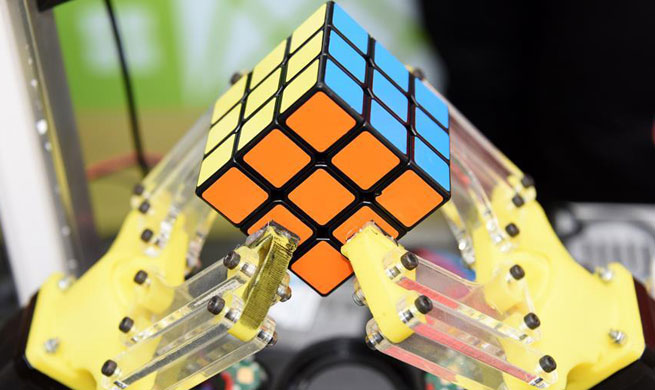LOS ANGELES, Nov. 25 (Xinhua) -- Engineers at NASA's Jet Propulsion Laboratory in Pasadena, California, conducted a last trajectory correction maneuver on Sunday to steer NASA's InSight spacecraft toward its entry point over Mars.
InSight is scheduled to touch down on Mars at approximately 3 p.m. EST (2000 GMT) on Monday, after a six-month, 300-million-mile (480-million-km) journey.
The lander will plunge through the thin Martian atmosphere, heatshield first, and use a parachute to slow down. Then, it will fire its retro rockets to slowly descend to the surface of Mars, and land on the smooth plains of Elysium Planitia.
About two hours before hitting the atmosphere, the entry, descent and landing team might also upload some final tweaks to the algorithm that guides the spacecraft safely to the surface.
These will be the last commands issued to InSight before it robotically guides itself the rest of the way, according to the InSight team.
Launched on May 5, InSight marks NASA's first Mars landing since the Curiosity rover in 2012 and the first dedicated to exploring the deep interior of Mars.
After touching down, InSight will spread its solar panels, unfold a robotic arm, and stay put. Unlike the space agency's rovers, InSight is a lander designed to study an entire planet from just one spot.
It will detect geophysical signals deep below the Martian surface, including marsquakes and heat. Scientists will also be able to track radio signals from the stationary spacecraft, which vary based on the wobble in Mars' rotation, according to NASA.
"We've studied Mars from orbit and from the surface since 1965, learning about its weather, atmosphere, geology and surface chemistry," said Lori Glaze, acting director of the Planetary Science Division in NASA's Science Mission Directorate.
"Now we finally will explore inside Mars and deepen our understanding of our terrestrial neighbor as NASA prepares to send human explorers deeper into the solar system," she said.












